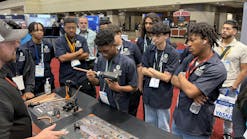Last month I detailed how to find, interview, and hire an experienced sales professional from outside of the industry.
This month, I'll go over the 5-day training program I've used to train hundreds of residential replacement salespeople with no previous HVAC experience. As this training progresses, you'll know whether or not you've hired the right person. With the exception of one new hire, every single salesperson I hired closed their very first lead.
You won't make a person an expert in HVAC in five days, but they'll know enough to get started in this industry. If they're curious, ambitious, and motivated, they'll spend the rest of their lives getting the rest of it down.
To set the stage, the person you're training has the following qualifications/abilities:
- Already an award-winning in-home salesperson (siding, windows, carpeting, roofing, etc.)
- Mathematical proficiency, specifically in geometry and fractions
- Mechanical aptitude
- The ability to draw a floor plan of a home.
Since salespeople earn their living with words, the training focuses heavily on terminology. It starts with the terms most often encountered by HVAC replacement salespeople. It's not necessary for them to be able to recite the dictionary definitions of the components of a home comfort system. They must be able to identify them and have a vague idea of what they do.
Since I required a drawing and a load calculation of every home, the training also focuses heavily on that.
It would be helpful to supply them with a copy of the book, The Old House; Heating, Ventilation, and Air Conditioning, by Richard Trethewey. It's not perfect, but it's an easy read and more than adequate to get someone started on their journey toward a career in HVAC.
DAY ONE
8:00 AM - Furnaces:
This is a hands-on session, during which you'll point out the various components of a furnace. Take them to your junk pile and point out the various components of some furnaces you've replaced.
Here's a list of the terms they need to understand in order to speak intelligently and authoritively about furnaces and heating:
- BTU
- Input
- Output
- Blower
- Squirrel cage
- Flue
- Induced draft
- Burner
- Heat exchanger
- High limit control
- Pilot
- Electronic and spark ignition
- Thermocouple
- AFUE
- Combustion air
- Plenum
- Ductwork
- Horizontal and Vertical furnaces
- Codes/permits.
11:00 am - Load Calculation
The quickest way to teach someone how to do an accurate load calculation is with software, such as Wrightsoft's Right-J®. With the Right-Draw® option, the mobile app version will let you draw the structure and will instantly calculate the load once the building details are selected.
1:00 PM: Lunch break
2:00 PM: Air Conditioning
Once again, take them to some of your junk equipment in the back and go over the following components:
- Compressor
- Freon/Refrigerant
- Condenser coil
- Condenser fan
- Condensing unit
- Evaporator
- Condensate drain
- Air handler
- Capacitor
- Contactor
- Time delay
- Filter drier
- Lineset
- SEER
- Ton.
3:00 PM: Sales training
Your best bet is to use a book, audio book, or video series of an industry sales trainer whose work you approve of. I recommend my audio book, "Slacker's Guide to HVAC Sales on MP3."
Homework:
Provide them with a copy of your company's "Features and Benefits" list (there's one included in "Slacker's Guide to HVAC Sales") and have them memorize as much of it as possible overnight. They should be able to memorize at least a dozen of them, and I've had plenty of people memorize the entire list overnight, and even make up a few new ones on their own. Note - do not let them run any sales calls until they can recite at least two dozen reasons to buy from your company from memory.
DAY TWO
8:00 AM: Practical exercise
Go to a house and have the salesperson draw its floor plan and do a load calculation on it, preferably with no help from you.
11:00 AM: Energy savings
The easiest way to determine the energy savings in replacing old, inefficient systems with new, high-efficiency systems is by using the free website, hvacopcost.com.
1:00: Lunch break
2:00 PM: Company paperwork.
Go over how to use:
- Whatever app or book you use to price jobs
- How to properly fill out a proposal
- Job flow once a job is sold
- Commission sheets
3: 00 PM: Sales Training
They've got to be able to tell people your "company story" and have a variety of closing techniques, which you should have in whatever industry-specific sales training materials you provide. This will take the rest of the afternoon, and they can do it on their own, freeing you up for the rest of the day.
Homework:
Have the trainee draw another home, run a load calc, then write up a proposal for that job.
DAY THREE
8:00 AM: Check their homework
There will probably be a much of mistakes, and this could take all morning.
1:00 PM: Heat Pumps
Take them out to some old heat pumps you've replaced and go over its components. Specifically:
- Reversing valve
- COP
- HSPF
- Defrost cycle
- Balance point
- Duel fuel.
3:00 PM: More paperwork
Make sure they completely understand what financing you offer and how to do that paperwork
4:00 PM: Sales training
It's time for them to learn some techniques for overcoming objections.
Homework:
Have the trainee video record them doing a complete presentation to the best of their ability.
DAY FOUR
Sales training:
Go to two separate residences (your home, the trainee's home, or the home of a friend or employee) and go through two complete presentations, from the greeting at the door, to the questionnaire and warm-up, to the equipment inspection, drawing the home, the load calculation, pricing it out, presenting it, and closing.
Take the trainee to a couple of installations in progress and have them meet your installers and happy customers.
DAY FIVE
Run actual leads. I usually ran the first lead, with the trainee remaining absolutely silent during the entire process, unless I specifically ask for their input.
From there, they run the entire lead. If you've hired the right person, there's a good chance they're willing to go out on their own. I can't help but mention that one of the best salesperson I ever hired, with the understanding that I'd be out-of-town for a couple of days and their training would start when I returned, went behind my back, asked for leads, and went out and closed them with no training whatsoever!
Charlie Greer was voted "Favorite Industry Sales Trainer" and is the creator of "Slacker's Guide to HVAC Sales." For more info on Charlie's products and services, call 1-800-963-HVAC (4822) or go to www.hvacprofitboosters.com. Email Charlie at [email protected].









